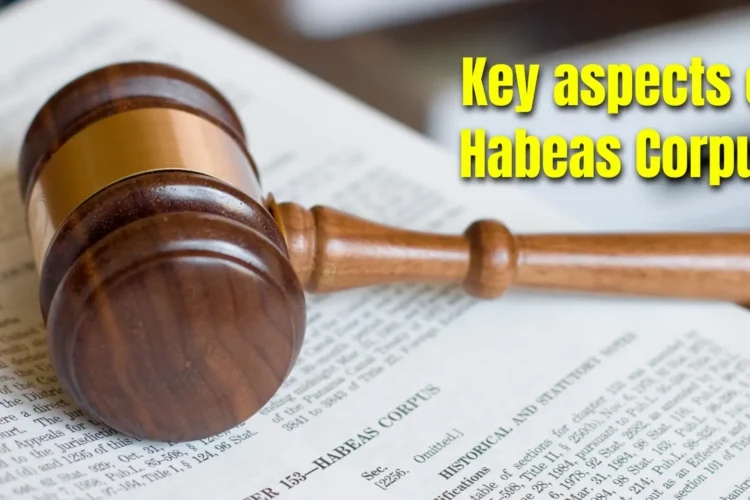In a world where individual freedom and civil rights are paramount, understanding the role of a habeas corpus lawyer becomes crucial. These professionals play a vital part in safeguarding our constitutional rights, particularly the right to challenge unlawful detention. At its core, habeas corpus is about protecting personal liberty against unjust incarceration.
When we discuss habeas corpus, we’re touching on a significant element of the U.S. Constitution that underscores the importance of checks and balances in the justice system. With the threat of wrongful imprisonment, it’s the habeas corpus lawyer who acts as a defender, ensuring our legal system respects individual freedoms. Such dedication to justice is often the difference between confinement and liberation.
Given the complexities of civil rights cases, having an experienced lawyer can make all the difference. They not only navigate the legal terrain but also stand as a pillar of support in challenging times. Their expertise ensures that unlawful detention is not just contested but rectified, reinforcing our trust in legal protections. learn more about Habeas Corpus attorneys
Habeas corpus attorneys play a vital role in safeguarding individuals’ constitutional rights, particularly the right to be free from unlawful detention. The term habeas corpus—Latin for “you shall have the body”—refers to a legal action that allows individuals who believe they are being unlawfully held in custody to challenge their detention before a court. Habeas corpus attorneys specialize in representing clients who may be wrongfully imprisoned, facing indefinite detention, or held without sufficient evidence or legal justification. These attorneys file writs of habeas corpus, arguing that the detention violates the individual’s constitutional rights, often based on issues such as illegal arrest, wrongful conviction, or procedural errors in the legal process. In addition to criminal cases, habeas corpus attorneys may also assist in cases involving immigration detention or mental health commitments. By ensuring that the government respects due process and limits its power to detain individuals without just cause, habeas corpus attorneys play a crucial role in protecting personal liberty and preventing abuses of power within the justice system.
Understanding Habeas Corpus
Habeas Corpus serves as a critical mechanism for challenging unlawful detention, grounded in the U.S. Constitution. Its roots extend far back in legal history, and the process demands thorough knowledge and precision.
Origins and Constitutional Basis
The roots of Habeas Corpus trace back to 1215 with the signing of the Magna Carta in England. This legal tradition emphasizes protecting individual liberties against arbitrary detention. Our Constitution enshrines this right through the Suspension Clause, ensuring its relevance in both federal and state jurisdictions.
Central to Habeas Corpus in the United States is the Fifth and Fourteenth Amendments, which secure due process rights. These rights lay the groundwork for contesting imprisonment, forming a critical pillar of our civil rights.
The Process of Filing a Habeas Corpus Petition
Filing a Habeas Corpus petition involves submitting a Writ of Habeas Corpus to a court, often a Federal Court if challenging a state conviction. The petition must outline the legal basis for the claim, such as Ineffective Assistance of Counsel.
The process demands attention to detail, with strict adherence to the Statute of Limitations. Missing deadlines could forfeit the chance to contest a wrongful detention. Petitioners may proceed after exhausting Direct Appeal and Criminal Appeal avenues.
Roles and Responsibilities of a Habeas Corpus Attorney
Habeas Corpus attorneys play a vital role in navigating the complex matrix of Federal Law and State regulations. They provide essential Legal Advice, ensuring that petitions pinpoint Good Cause and comply with legal standards.
These attorneys often offer consultations to evaluate the merits of a case, strategically reinforcing arguments to increase the likelihood of court success. Effective representation in Federal Courts can make a difference between lawful freedom and continued detention.
In this legal landscape, we must emphasize the importance of expert guidance in pursuing justice through Habeas Corpus proceedings.
Challenges and Considerations in Habeas Corpus Cases
Navigating habeas corpus cases involves understanding intricate legal grounds and addressing multifaceted issues like immigration. Attention to details such as prosecutorial misconduct or detention conditions is crucial.
Common Grounds for Habeas Relief
In habeas corpus cases, prisoners often seek relief based on grounds such as violations of constitutional rights or procedural errors. Prosecutorial misconduct, jury misconduct, and claims of insufficient evidence can be pivotal.
Issues like double jeopardy and lack of a speedy trial also frequently arise. We often explore conditions of confinement, which may warrant relief when they violate basic civil rights.
Accessing remedies requires examining federal writs, detailed in the Georgia Constitution and other legal frameworks. Circuit courts regularly explore these nuances, balancing justice and legal mandates.
Habeas Corpus in the Context of Immigration
Habeas corpus extends to immigration, focusing on deportation and detention matters. We see cases involving Immigration and Customs Enforcement, where individuals contest unlawful detention or extradition orders.
Requests for bail or bond hearings often accompany these cases, challenging the grounds of detention. The U.S. Marshals Service and the Federal Bureau of Investigations occasionally play roles in these complex scenarios.
By seeking habeas relief, we can question lengthy detentions without hearings. Our judicial approach ensures that individuals’ rights are upheld in the face of stringent immigration enforcement practices.

Ms Aditi Sharma, Advocate, Delhi High Court, Jotwani Associates, Intellectual Property Rights. This article is written by Aditi Sharma, an experienced lawyer with a proven history of working in the Legal Industry. Key areas of expertise: Legal drafting, Divorce Law, Corporate Law, Family Law, Criminal Law, Property Law, Patent Law, Civil Law, etc.

